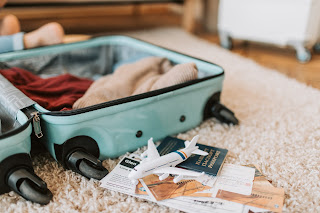When you embark on your travels, it's essential to prioritize the safety and security of your belongings. Travel locks play a crucial role in protecting your luggage and giving you peace of mind throughout your journey. In this blog post, we will explore the importance of travel locks, discuss the different types available, including combination, keyed, and TSA-approved locks, and provide locking strategies for different luggage types. Discover how to keep your belongings secure and enjoy a worry-free travel experience.
I. Types of Locks: Combination, Keyed, and TSA-Approved
Combination Locks:
a. Convenience and Security: Combination locks offer the convenience of not needing to carry keys. Set a unique combination that is easy for you to remember but difficult for others to guess.
b. Resettable Combinations: Choose combination locks that allow you to reset the code, providing flexibility and ensuring optimal security.
Keyed Locks:
a. Enhanced Security: Keyed locks offer robust security, as they require a specific key to unlock. Keep the key in a safe place, such as a hidden pocket or a secure compartment in your bag.
b. Spare Key Considerations: If you opt for a keyed lock, consider carrying a spare key separately from the original in case of emergencies or misplacement.
TSA-Approved Locks:
a. Traveling to the United States: If you're traveling to or within the United States, consider using TSA-approved locks. These locks can be opened by Transportation Security Administration (TSA) agents using a master key, allowing for inspection without damaging the lock or your luggage.
b. Indicator Function: Look for TSA-approved locks with an indicator function that changes color to signify when the lock has been opened by TSA, providing you with peace of mind.
II. Locking Strategies for Different Luggage Types
Suitcases with Zippers:
a. Double-Zipper Locking: Lock your suitcase zippers together to deter casual theft. Choose locks with long shackle lengths to accommodate larger zipper pulls.
b. Looping Locks through Handles: Loop the lock through the suitcase handles to prevent the zippers from being opened, adding an extra layer of security.
Hardshell Suitcases:
a. Locking the Built-In Locks: Many hardshell suitcases come with built-in combination or key locks. Utilize these locks by setting a secure code or using the provided key to prevent unauthorized access.
b. Additional External Locks: Consider adding an external lock for added security, especially if the built-in lock is not sturdy or if you desire an extra layer of protection.
Backpacks and Carry-On Bags:
a. Lockable Compartments: Choose backpacks or carry-on bags with lockable compartments or pockets, providing a secure place for your valuable items.
b. Cable Locks: Use cable locks to secure your backpack's zippers together or attach your bag to a fixed object to deter theft.
Summary:
Travel locks are an essential tool for safeguarding your belongings while on the move. Consider the different types of locks available, such as combination, keyed, and TSA-approved, based on your preferences and travel needs. Implement effective locking strategies depending on the type of luggage you're using, be it suitcases with zippers, hardshell suitcases, backpacks, or carry-on bags. By incorporating travel locks into your security measures, you can ensure the safety of your belongings and enjoy your travels with peace of mind.



